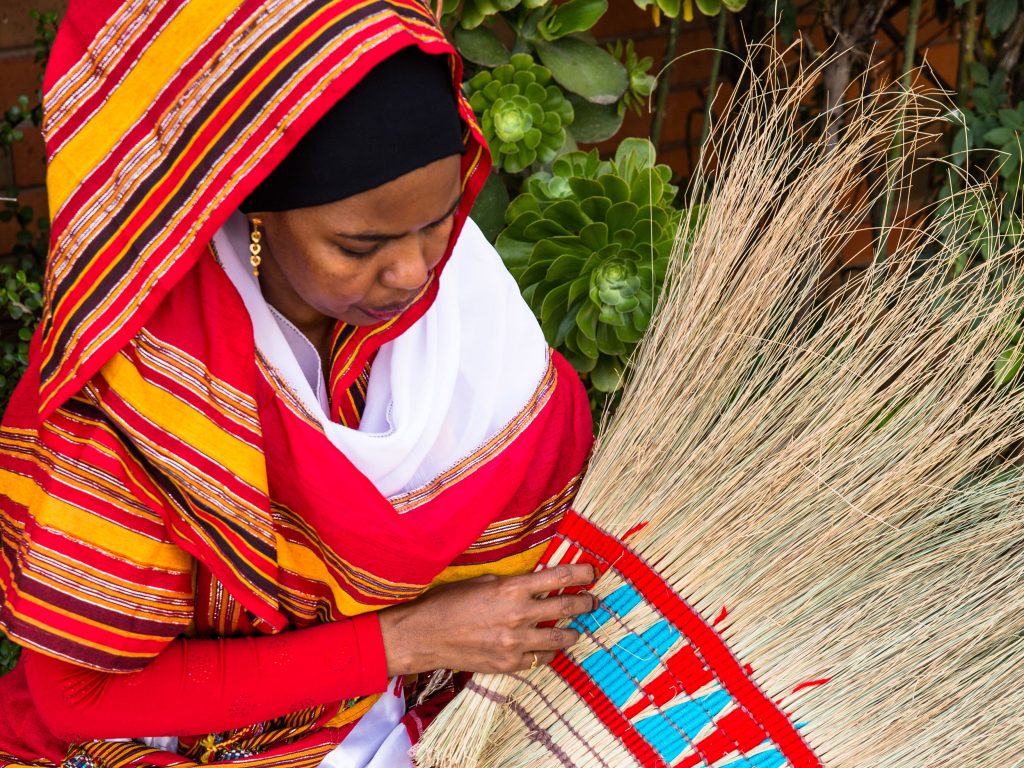Meet the Maker: Muhubo Sulieman, Qaymi Arts & Crafts

Muhubo Sulieman is the head weaver at Qaymi Arts & Craft — a traditional Somali weaving practice. Having grown up in Somalia, Muhubo learnt traditional weaving techniques from her mother and her older sister. She recalls, with fondness, the thatched huts she grew up in — known in the Somali language as an aqal. These portable structures, explains Muhubo, provided safety and shelter for nomadic families as they moved across the land in search of greener pastures.
Today, Muhubo hosts traditional weaving workshops and exhibits her work at various community organisations and exhibition spaces across Melbourne. She is motivated by a desire to preserve her cultural heritage, and to preserve a craft that has been handed down to her by previous generations.
For MPavilion 10, we have commissioned Muhubo to build a traditional aqal in the pavilion as part of our Craft Commission. We spoke to Muhubo to learn more about her practice and her story.
What is your earliest memory of weaving?
My earliest memory of weaving is from when I was 5. My older sister and I were making baskets to carry water by burning the spikes off the tree branches and roots. This process of making the basket was the first thing I was taught and one of my strongest memories with my sister.
Can you explain what an aqal is, for those who don’t know?
An aqal is the name for a traditional Somali hut, used by nomadic people as it can be easily disassembled and reassembled when they have to move to greener pastures. It’s also waterproof.
How do the natural materials in Australia differ from the materials in Somalia? What types of grasses, trees and materials do you use to make your creations?
Since I’ve been in Australia, I’ve found that a lot of the grass is very similar to Somali grass, which is why I was able to start weaving again. The differences I’ve noticed would be that grasses and trees in Somalia are healthier and less brittle and more easily bendable. The grass from Somalia is also waterproof. I currently use Kangaroo grass and Poa grass in my weaving. These grasses are native to Australia and are easily adaptable for traditional weaving.
What is something that you do every day?
I like to do a small amount of weaving or some sewing everyday. It helps me de-stress, and it also means that by the end of the day I will have created something nice. I also like walking around parks, sitting down outside and just relaxing.
Where do you look for inspiration?
My family is a big inspiration for me. My mum and older siblings taught me how to weave and I love to incorporate that with the ideas I come up with, and also the ideas my kids come up with. Being able to blend my Somali culture and heritage with my life in Australia has been a huge source of inspiration for me.
The name Qaymi comes from my grandmother. People used to call her Qaymi, which means “genius or innately special”. She used to be able to fix everything and create incredible things from scratch.
What is a philosophy you live and work by?
“Everything happens for a reason”. I believe everything is god’s will and everything happens at the right time and not before.
My daughter, when she was in primary school, randomly remembered that I used to do grass weaving. On her next school trip, she took a plastic bag with her and filled it with lots of different types of grasses and asked me to make it. I hadn’t done grass weaving since I arrived in Australia and I didn’t think I could find similar grass, but she brought me some and the muscle memory came back and I fell in love with weaving again. I haven’t stopped since.
What excites you about this year’s MPavilion, which has been designed by the Japanese architect Tadao Ando?
It feels very fresh and new to me. I’m very excited to see the difference between my structure — that is, traditional Somali architecture — and Japanese architecture. I feel that it will blend together beautifully.
Qaymi Arts & Crafts was selected as this year’s Craft Commission. What are you looking forward to sharing with visitors during your week-long workshop?
I am very much looking forward to introducing people to Somali culture, and having them learn or take inspiration from my upbringing. I look forward to seeing people learn new skills that they previously didn’t know about or fully understand. My goal is for everyone to feel as though they are a part of my family and to feel the connectedness of what I am sharing with them.
I also wish to share the new things that can come from Australian materials and the incredible bond between Australia and Somalia. There’s a saying that Somali people believe, which is “farkiliyah fuul madhaqdo”. It means “one finger can’t clean your whole face”. You need to work together to achieve a goal. One person can’t do everything.
—
Visit MPavilion between 20 to 25 February to see Muhubo’s aqal come to life. Visitors are encouraged to participate in the building of the structure and to join Muhubo in this act of creative collaboration and cultural exchange.
MPavilion 10 Craft Commission